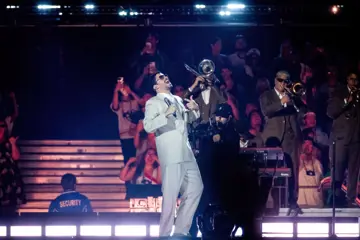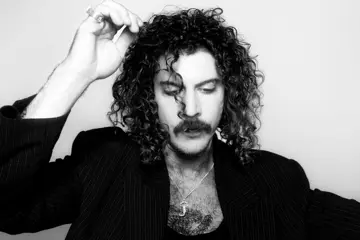pitch perfect 3

There’s one moment where Pitch Perfect 3 comes to life; this so obvious to the filmmakers that it’s repeated twice, first as cold open, then as climax. In the absence of any inspired ideas or reason to exist beyond contractual obligation, yet another lap around the competitive-a-cappella-groups block is, for a sequence, suddenly a spy-movie. Due to plot developments that deliver John Lithgow with a bad Australian accent, the rest of the Barden Bellas are kidnapped and held for ransom on a Bond Villain-worthy yacht. And, so, series leads Rebel Wilson and Anna Kendrick must save the day. Cue Wilson transforming into an unstoppable badass, cutely-choreographed fights, and a barrage of explosions. It’s absurd to inject such foreign genre action into the world of Pitch Perfect, but that absurdity works, providing some thrills in the way the film ridiculously transforms. Of course, the fact that Pitch Perfect 3 is at its best when it doesn’t resemble the series at all effectively serves as indictment of the rest of the movie, and of the decision to squeeze one final (well, hopefully) flick from the franchise.
It’s not like the series even began in a good place. The Pitch Perfects are, essentially, movies about music for people who actually hate music: the supposed portrayal of “a cappella” instead delivering mimed versions of studio-slick, effects-thick playback; the dramatic narrative like reality-TV-singing-contest turned motion-picture plot. Running this shtick back for a dispiriting third time is less a case of diminishing returns than flogging a dead horse. Director Trish Sie arrives off the back of her first feature, 2014’s Step Up: All In, meaning she’s familiar with captaining the deep instalments of vaguely-music-themed series.
Now graduated college, the Bellas band gets back together as a form of therapy, women heading towards 30 wanting to return to the place of their youthful dreams, out to escape flagging careers and lives. Leaving the US behind, they’re off to undertake a tour of army bases, not in Middle East conflict zones, but exotic Mediterranean locales. Meaning, the same old show is sent out on the road, with lots of B-roll of beaches and harbours, and much of the ‘action’ taking place in wealth-porn luxury hotels. They’re in a reality-TV-esque contest with three stereotypical outfits —washboard-andfiddlin’ bluegrass yokels Saddle Up, rock outfit Evermoist (fronted by Ruby Rose, no less), trap duo Young Sparrow & DJ Dragon Nutz— to win a “record deal” with DJ Khaled. If anything is a sure sign of how artistically-bankrupt Pitch Perfect 3 is, it’s the way the film wholly hitches its wagon to a star of such marginal musical interest. And it’s no mere cameo, Khaled’s name mentioned more times in the script than the word ‘and’, intoned as if he is some veritable God amongst mortals, able to change fates with a flick of his diamond-encrusted fingers. All this Khaled worship is a bizarre look for an otherwise-entirely-fictionalised story, the flick openly burnishing his celebrity brand whilst tarnishing its own.
What’s notable is that screenwriters Kay Cannon and Mike White(!) know that they’re just delivering more of the same, and make an on-going comic riff of their use of tropes. Outside of Wilson’s comic riffs, the only laughs to be found are when the series’ staples — that red solo cup; the semi-anonymous members of the ensemble; the two-dimensional caricaturisation; the need for competition, a grand final, and resolution— are trotted out, then mocked. “That was a lot of exposition,” a character notes, after the rules of the contest are explained. “Wow, that was really cheesy,” a blue-eyed, square-jawed, love-interestready army-bro apologises, after delivering the big emotional speech about how the gals have, by now, become family. It’s nice that the film’s aware of its own clichés, and happy to laugh at them. But not so nice that anyone involved couldn’t think of a way to not employ all those clichés.
all the money in the world

Don't miss a beat with our FREE daily newsletter
What’s a more unnerving visual spectacle: Kevin Spacey —and all that he entails— plastered in old-man makeup? Or Christopher Plummer, digitally-spliced into scenes that Spacey once shot? Gladly, for Ridley Scott’s All The Money In The World, it’s probably the former. Especially given that the film’s fate —as prestige picture primed for awards-show run, yet suddenly facing unreleasable oblivion— hung in the balance once various allegations were made re: Spacey all but two months ago. In the face of such, Scott — every bit as prolific and productive as his 80-something peers Woody Allen and Clint Eastwood, but without the same singular cinematic obsessions— got to work. New takes with Plummer were shot; whether on set or in front of green screen.
As well as avoiding radioactive publicity, it also feels like an upward move; All The Money In The World receiving the belated gift of Plummer’s gravity, charm, and old age. Where Spacey had been caked in make-up to play oil billionaire J.P. Getty in his final, tight-fisted days, Plummer just turned 88 years old; adding resonance to his depiction of a Citizen Kane/Montgomery Burns-esque figure, retreating into isolation, paranoia, and melancholia in his gilded palace. Scott’s film —his second of the year, following his unsatisfying Alien redux — is a based-on-a-true-story tale of a high-profile kidnapping case. Though media scandal in its five-decades-ago day, it’s a tale ripe for the retelling, for the vast audience who’ve never heard it.
In 1973 Italy, Getty’s grandson is kidnapped and held for ransom; in the face of such, the world’s richest man steadfastly refuses to pay it. To him, it’s another business negotiation; and to pay for the return of his kin —a no good hippy!— is a losing proposition. David Scarpa’s script —working from accounts in John Pearson’s Painfully Rich: The Outrageous Fortunes And Misfortunes Of The Heirs Of J. Paul Getty— bounces, essentially, between twin narratives. Young Paul (Charlie Plummer, no relation) is held in various barns and houses in the Italian countryside, presided over by a sympathetic captor (Romain Duris). And his fretful mother (Michelle Williams) tries, in vain, to get her father-in-law to pay up, and have her son set free. Linking the narratives are the phone calls between Duris and Williams, which often have the feeling of powerless middlemen, each messengers for forces beyond they. There’s a growing empathy there, but the best shade comes from Duris’s outrage; the captor unable to believe that the world’s wealthiest scion would so unashamedly prize money over family. Eventually, Mark Wahlberg arrives as the film’s most rewritten subject, ready to push things towards a conclusion. In real life, former CIA operative Fletcher Chase was ridiculous and clueless, as paranoid as the billionaire who employed him. Here, he’s a figure of command and surety, played by Wahlberg with his familiar sincere simplicity; a negotiator turned action-hero, ready for the final-act turn into pure thriller.
Whilst Williams delivers another sterling performance in a career full of them, and the Plummer-for-Spacey sub-in likely improved the film, All The Money In The World feels like a gripping real-life yarn in search of a better movie. Scott’s direction feels stiff, the drama oddly formal. It’s often as if you can see the seams; witness the workings of a prestige-picture stitched together. And not just those moments in which Plummer looks like a spliced-in ghost, a spectre whose presence symbolises a dark time in Hollywood.
three billboards outside ebbing, Missouri

This wordy title is essentially a micro-premise. Outraged at the fact that no killer has been found for her daughter’s death, a grieving mother pays for three billboards on a backroad near her small-town home, challenging the police to do a better job. This is a provocation, dramatically and cinematically; few institutions having been given as much of a free pass for real-life horrors as that favourite staple of the genre-movie, the police force. And, here, what we get is a police force at war with its own community; so sensitive to any criticism that when one woman defies them, they hit back. Coming at this political time —and set in Missouri, the site of the horrifying scenes of militarised-police in Ferguson— it’s a premise that’s dramatically loaded; a powder-keg duly detonated.
Martin McDonagh, the Irish playwright best known for penning criminals spouting black-comic dialogue, delivers not just a striking premise, but a sterling film. It’s a work of social resonance and emotional weight, that never loses its sense of humour. That humour’s plenty profane, with dialogue somewhere between tart and acidic. But, for all the lulz, there’s a complexity to the film; in its scenario, sure, but, mostly, in its every character. Frances McDormand plays the lead character, one written by McDonagh for the actress; bringing fire and ferocity to the role, a woman refusing to be cowed by the condescending men-in-power out to silence her. These police aren’t simple goons, though: not Woody Harrelson’s beloved police-chief, who, in the grips of late-stage cancer, has found equanimity and grace; not even Sam Rockwell’s redneck stooge, a mama’s-boy meathead who’s given the script’s greatest opportunities for shade, change, contradiction, growth.
Despite initially setting McDormand and Rockwell against each other, no one here is either hero or villain; violent ex-husbands (John Hawkes), depressed sons (Lucas Hedges), drunken trophy-wives (Abbie Cornish), and “the town midget” (Peter Dinklage) all written with the same empathy, clarity of voice. Befitting a film that never sits in judgment of its characters, the best thing about Three Billboards Outside Ebbing, Missouri is its refusal to submit to simplicity, and finality. The narrative set-up summons grand dramatic themes like justice, retribution, reparations, and accountability; but, McDonagh realises, there’s no way these should play out with blackand-white morality. The film’s best scene is its final one, an open-ended end that leaves all these questions unanswered, its moral quandaries unresolved.















